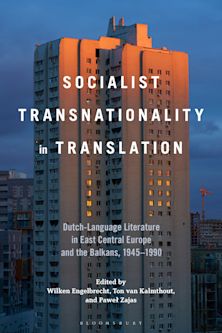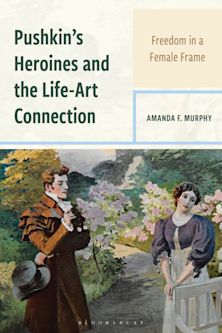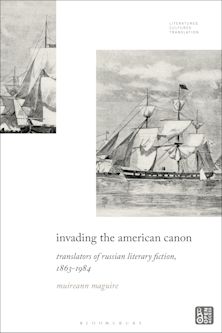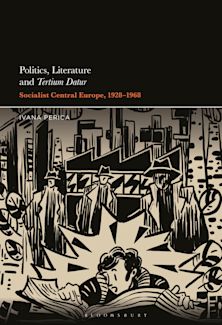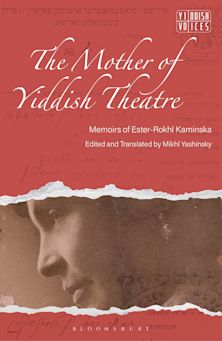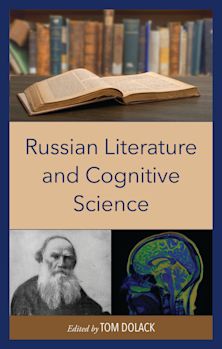- Home
- ACADEMIC
- Literary Studies
- Russian, Central and East European Literature
- Babel in Russian and Other Literatures and Topographies
Babel in Russian and Other Literatures and Topographies
The Tower, the State, and the Chaos of Language
Babel in Russian and Other Literatures and Topographies
The Tower, the State, and the Chaos of Language
This product is usually dispatched within 1 week
- Delivery and returns info
-
Free US delivery on orders $35 or over
You must sign in to add this item to your wishlist. Please sign in or create an account
Description
This study analyzes the biblical Tower of Babel story, a cautionary tale that accounts for the diversity of languages and peoples, in Russian literature and other topographies. The author pursues its linking of language, architecture, and society as well as its relevance in art and literature over centuries. To come to terms with a perceived disorder in the realm of language, alternative explanations and projects for remediation abound. The disorder and diversity themselves find expression in art, literature, and philosophical reflection and caused the emergence of a historical linguistics. The ambition of the builders—with its social and organizational premise—reemerges in both political and material form as cities, states, and monumental constructions. Utopian aspirations and linguistic claims permeate both revolutionary notions of universality and the romantic essentialism of the nation state. These in turn provoke dystopian critique in literature and film. As Martin Meisel reveals in this study, the wrestle with language in its recalcitrant instability and imperfect social function enters into dialogue with the celebration of its diversity, elasticity, and creativity.
Table of Contents
Part I. Words and Things
Chapter 1: Nimrod's Tower.
Chapter 2: Monody and Polyphony
Chapter 3: The Horizon of Etcetera.
Part II: Building the Future
Chapter 4: The Monument and the Labyrinth
Chapter 5: The Electric City
Chapter 6: Public and Private
Chapter 7: After Babel
Product details
| Published | Aug 15 2019 |
|---|---|
| Format | Hardback |
| Edition | 1st |
| Extent | 168 |
| ISBN | 9781498588379 |
| Imprint | Lexington Books |
| Illustrations | 24 b/w photos; |
| Dimensions | 9 x 6 inches |
| Series | Crosscurrents: Russia's Literature in Context |
| Publisher | Bloomsbury Publishing |
About the contributors
Reviews
-
[A] richly rewarding pendant volume. . . . Babel in Russian’s horizon is modern Russian literature and culture, but its scholarly contribution finally has more to do with the wealth of information it collects and constellates than an argument that begins with Nimrod and ends with A. R. Ammons. The overriding effect of the intricate web of connections Meisel weaves in Babel in Russianis to suggest that the realization of the sublimity the Tower was intended to embody is finally to be found not in the imagined edifice but in its ongoing reception in Western culture.
Modern Philology
-
This is a lucid and erudite study of one of the defining myths of western culture. Martin Meisel is a superb guide through the broad and often contradictory implications of the Babel story, and its long history of adaptation and interpretation, culminating in its appearance as a great enabling trope in modernist literature.
Stephen Orgel, Stanford University
-
As a follow-up to Chaos Imagined, Martin Meisel explores how language and chaos make and unmake each other. Babel is another coruscating contribution shot through with Meisel's sly humor and extraordinary erudition.
R. Darren Gobert, Duke University
-
'Chaos is come again!' predicts Othello. Nothing daunted, Martin Meisel plunges directly into the linguistic and intellectual chaos figured by the Tower of Babel in order to make sense of it. Paradoxically, his account is eminently lucid, illuminated by flashes of wit and pyrotechnic displays of erudition. The breadth of coverage extends from drama to architecture, with an equally impressive range of reference. Cross-cultural, cross-disciplinary, this is a masterfully researched, exquisitely written exploration of one of culture’s most slippery concepts.
Laurence Senelick, Tufts University
-
This book reaches back into a Biblical past—Babel as origin of “linguistic chaos”—with a theoretical panache that illuminates the present. Because Meisel is supremely well versed in areas ranging from visual art and architecture to literature, theater and cinema, he can mine Shakespeare, Moliere, Bruegel, Joyce, Metropolis, and Blade Runner for gems of lucidity.From “mutual incomprehension,” Meisel finds—or creates—meaning in a manner that is linguistically playful as well as philosophically profound.
Annette Insdorf, Columbia University
-
Meisel’s book should be read by everyone who takes the study of language seriously. Against the background of the biblical story of the Tower of Babel, Meisel examines language as an instrument of order and of chaos at the same time.The author’s remarkable erudition and analysis extend from Sumerian literature to “Blade Runner,” and much in between.
David Sperling, Hebrew Union College

ONLINE RESOURCES
Bloomsbury Collections
This book is available on Bloomsbury Collections where your library has access.













